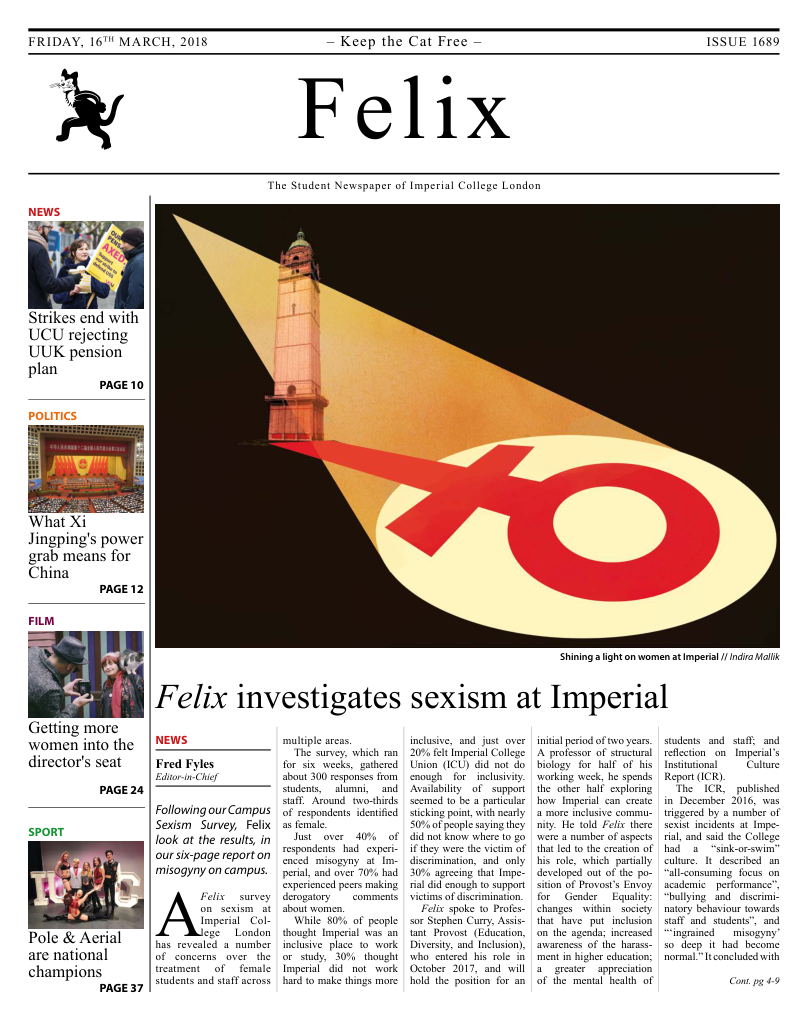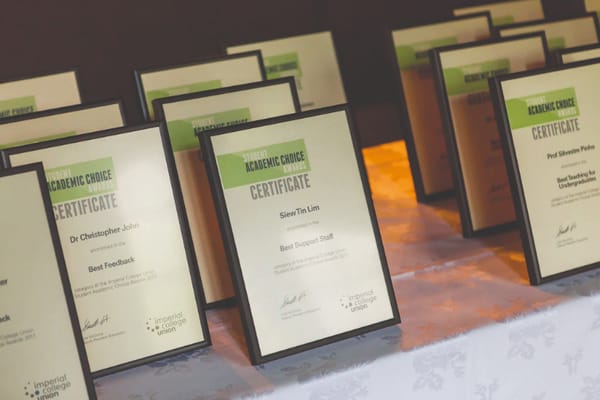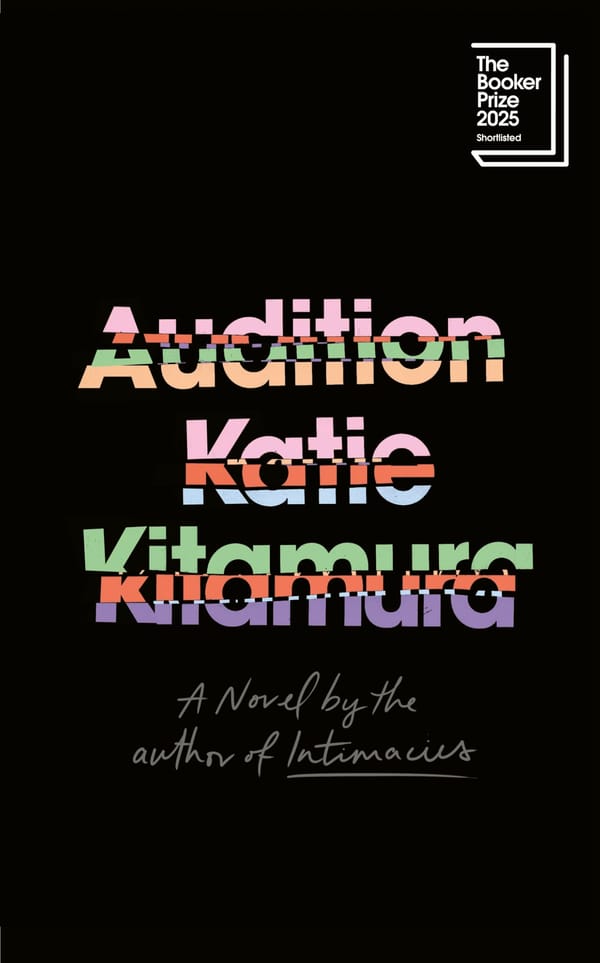Felix investigates sexism at Imperial
Following our Campus Sexism Survey, Felix look at the results, in our six-page report on misogyny on campus.

A Felix survey on sexism at Imperial College London has revealed a number of concerns over the treatment of female students and staff across multiple areas.
The survey, which ran for six weeks, gathered about 300 responses from students, alumni, and staff. Around two-thirds of respondents identified as female.
Just over 40% of respondents had experienced misogyny at Imperial, and over 70% had experienced peers making derogatory comments about women.
While 80% of people thought Imperial was an inclusive place to work or study, 30% thought Imperial did not work hard to make things more inclusive, and just over 20% felt Imperial College Union (ICU) did not do enough for inclusivity. Availability of support seemed to be a particular sticking point, with nearly 50% of people saying they did not know where to go if they were the victim of discrimination, and only 30% agreeing that Imperial did enough to support victims of discrimination.
Felix spoke to Professor Stephen Curry, Assistant Provost (Education, Diversity, and Inclusion), who entered his role in October 2017, and will hold the position for an initial period of two years. A professor of structural biology for half of his working week, he spends the other half exploring how Imperial can create a more inclusive community. He told Felix there were a number of aspects that led to the creation of his role, which partially developed out of the position of Provost’s Envoy for Gender Equality: changes within society that have put inclusion on the agenda; increased awareness of the harassment in higher education; a greater appreciation of the mental health of students and staff; and reflection on Imperial’s Institutional Culture Report (ICR).
The ICR, published in December 2016, was triggered by a number of sexist incidents at Imperial, and said the College had a “sink-or-swim” culture. It described an “all-consuming focus on academic performance”, “bullying and discriminatory behaviour towards staff and students”, and “‘ingrained misogyny’ so deep it had become normal.” It concluded with a number of recommendations, including creation of a senior management position responsible for “integrating equality and diversity provision within the institution”.
“There are a lot of challenges there, and no overnight solutions,” Professor Curry told Felix “Much of the ongoing work is trying to change the culture, and needs a lot of conversations with people.” While there have been a number of schemes initiated since the ICR – increased diversity training, signing up to the Race Equality Charter, and integration of equality, diversity, and inclusion within the new Learning and Teaching Strategy – Professor Curry said: “Clearly it’s a job not just for two or three years, but a job for the next 10-20 years. Imperial is embedded within a society that is deeply unequal in many ways. We want to be more proactive in trying to tackle that.”
This special report looks at the experiences of women across all aspects of Imperial life – from undergraduates, to academics, to clubs and societies, and finally to the issue of sexual harassment and violence – to see how far we’ve come over the past few years, and how far we still have to go.
If you are affected by any of the aspects highlighted by these articles, please consider contacting the Samaritans (08457 90 90 90) or speak to your personal tutor.
"Since coming to Imperial, I've always felt an undercurrent of sexism" – students speak out
Over half of the female undergraduates who completed the survey reported having experienced misogyny as part of their studies, and just over 40% of all respondents reported having witnessed it. A quarter of the women who responded also said they had experienced bullying or harassment due to their gender.
The vast majority of these experiences, based on reports obtained through the survey, were derogatory comments from the individual’s own peer group: over 75% of women said they had experienced peers making such comments during their time at Imperial, the majority of which involved sexualised language or belittling comments about their ability.
One student told Felix: “I can’t even begin to count the number of times derogatory comments have been made about myself and other female students. The constant objectification, judgement of our clothes and actions, and being constantly referred to as bitches, sluts, or whores… every time I call out a man on their use of derogatory language they laugh it off as harmless.”
Other students were accused of swapping sexual favours in exchange for good grades: one women was asked whether she was sleeping with a teaching assistant to get a good mark on her report, while another told Felix: “I was told I must have given the assessor a handjob under the desk because I did better than a male peer in a viva assessment.”
Many said they found it difficult to call out sexist language, with a number of women saying they were called “over-sensitive” or accused of “overreacting” when they challenged such comments. Three-fifths of the women surveyed said they had experienced derogatory comments about women being left unchallenged.
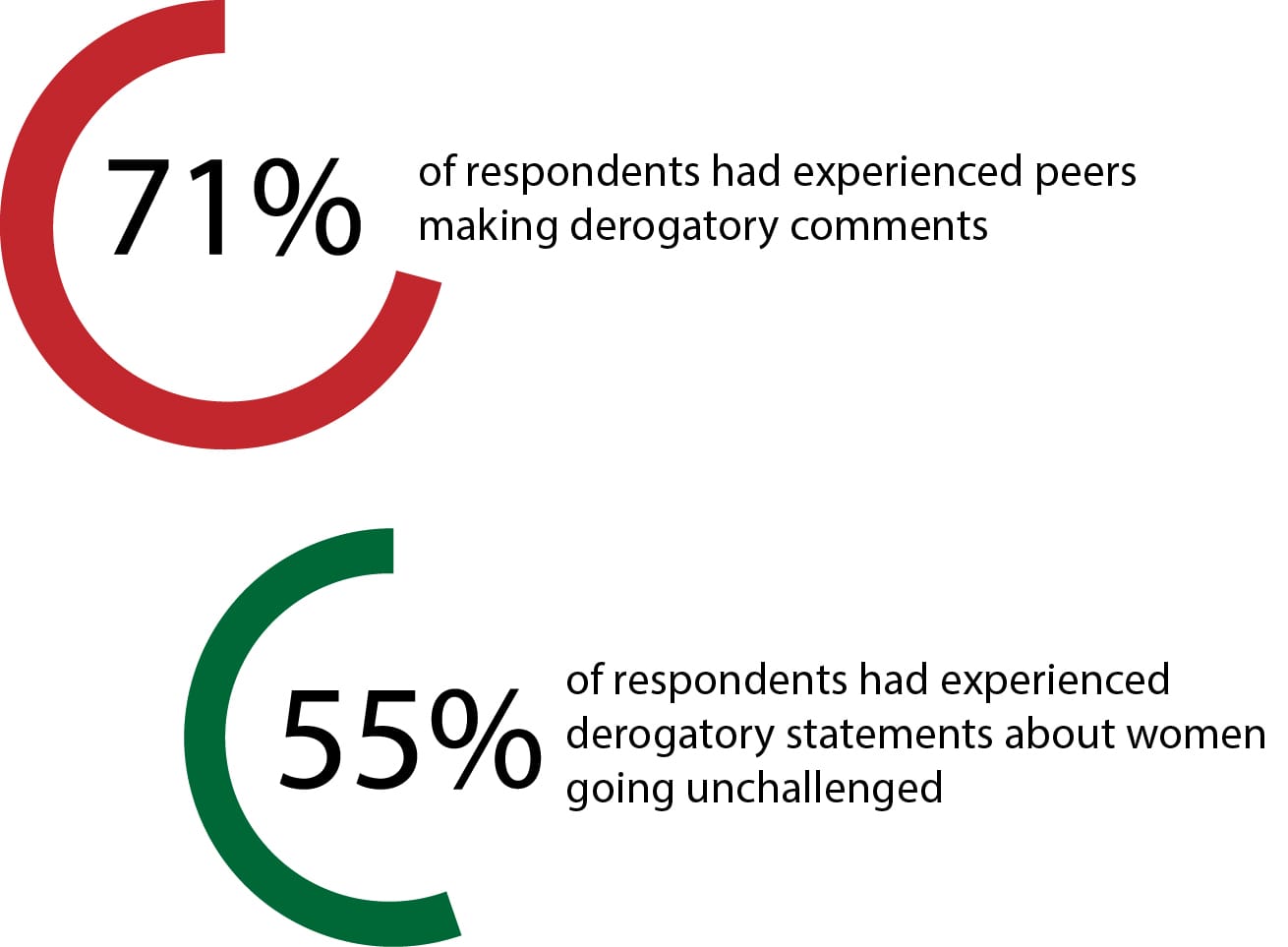
Professor Curry admits it is “impossible for College to police every single interaction that happens between students”, but says “every member of the College community has a responsibility for appropriate behaviour on campus”. One intervention he feels can lead to tangible change is the introduction of Active Bystander Training, which has been rolled out to a number of departments, and some key volunteers within ICU. The training, which teaches people to confront discriminatory behaviour, “is quite an effective way to start a conversation, to make sure more people are primed and equipped [to call out sexism]”.
He also highlighted the importance of codifying standards of behaviour from a student’s first day at Imperial: “We have to send out a very clear message at the beginning, saying we expect these standards of behaviour. In our Department [of Life Sciences] we have introduced lectures for freshers talking about respect, the Equality Act, what harassment means. It’s about trying to build a culture where it doesn’t matter who you are, you’re welcome here, and you’ll be treated with respect.
Katie*, a final year student in the Faculty of Engineering, told Felix she’d experienced sexism since arriving as a fresher: “Since coming to Imperial, I’ve always felt an undercurrent of sexism. It started in first year, walking past a male sports team at sports night – I was catcalled and looked up and down so fiercely that I felt exposed. This became a regular occurrence at almost every sports night. Casual sexism disguised as jokes and ‘lad banter’ has always been rife, so much so that even the women here have accepted and often go along with it – including myself as a naïve fresher, wanting to fit in.”
Katie also highlighted the difficulty in speaking out, but said it could also be due to intimidation women on campus feel. She described a number of incidents within the Royal School of Mines (RSM), including slut-shaming, derogatory chanting, and sexist behaviour by the ‘Chaps Club’ – one of Imperial’s ‘Tie Clubs’, which serves as a society for current and former members of Royal School of Mines Union (RSMU).
“We were told not to complain about sexist comments to ICU, since it would make our department ‘look bad’, and when one of my friends wanted to make a complaint about the Chaps we were told we had to take it up directly with them. It’s intimidating for a woman to speak to a large group of older men about their behaviour, and so she did not make the complaint. It’s hard as a woman to speak out about sexism through fear of becoming isolated, or receiving a backlash from peers for making a complaint”.
Robert Tomkies, the current RSMU President and ICU's President-elect, is aware of the challenges faced by women within the RSMU. He told Felix: “In the RSMU this year we have placed gender equality and inclusivity at the forefront of our priorities.” RSMU has identified a number of outdated traditions and sought to change them: a number of the old chants were retired, and new chants selected in the run-up to this year’s Bottle Match; people singing the old chants were identified and told to stop. Tomkies also cited a number of other concerning traditions that had been identified, such as the “President’s Yard’, which was previously done on stage in underwear, and has since been removed.
Regarding problems students had with coming forward, RSMU put in place anonymous surveys at the beginning of this academic year asking for feedback, and has since established an online incident form, where students can submit reports. They have secured funding for active bystander training for all key volunteers within the RSMU – including sports captains – and are looking into ways to prevent sexist individuals from attending RSMU events.
Tomkies told Felix: “Tackling these issues will take a continued drive from the RSMU over several years, but this year’s committee is proud to have been part of those steps. Culture change cannot happen overnight, but RSMU has started a change that lays strong foundations for greater inclusivity in the future.”
A representative of ICU told Felix: “These figures are very concerning. Misogynistic and discriminatory behaviour is simply not acceptable in any form to Imperial College Union, and that applies equally to all of our social spaces, student activities and events. We have trained our staff and student leaders in how to be ‘active bystanders’ and our professional staff deal swiftly with any incidents that take place within our bars and events.
We are working with College on the response to the Institutional Culture Review, and we acknowledge that we have work to do ourselves, to make clear to our members and volunteers that such behaviour is not welcome within the Imperial College Union community”
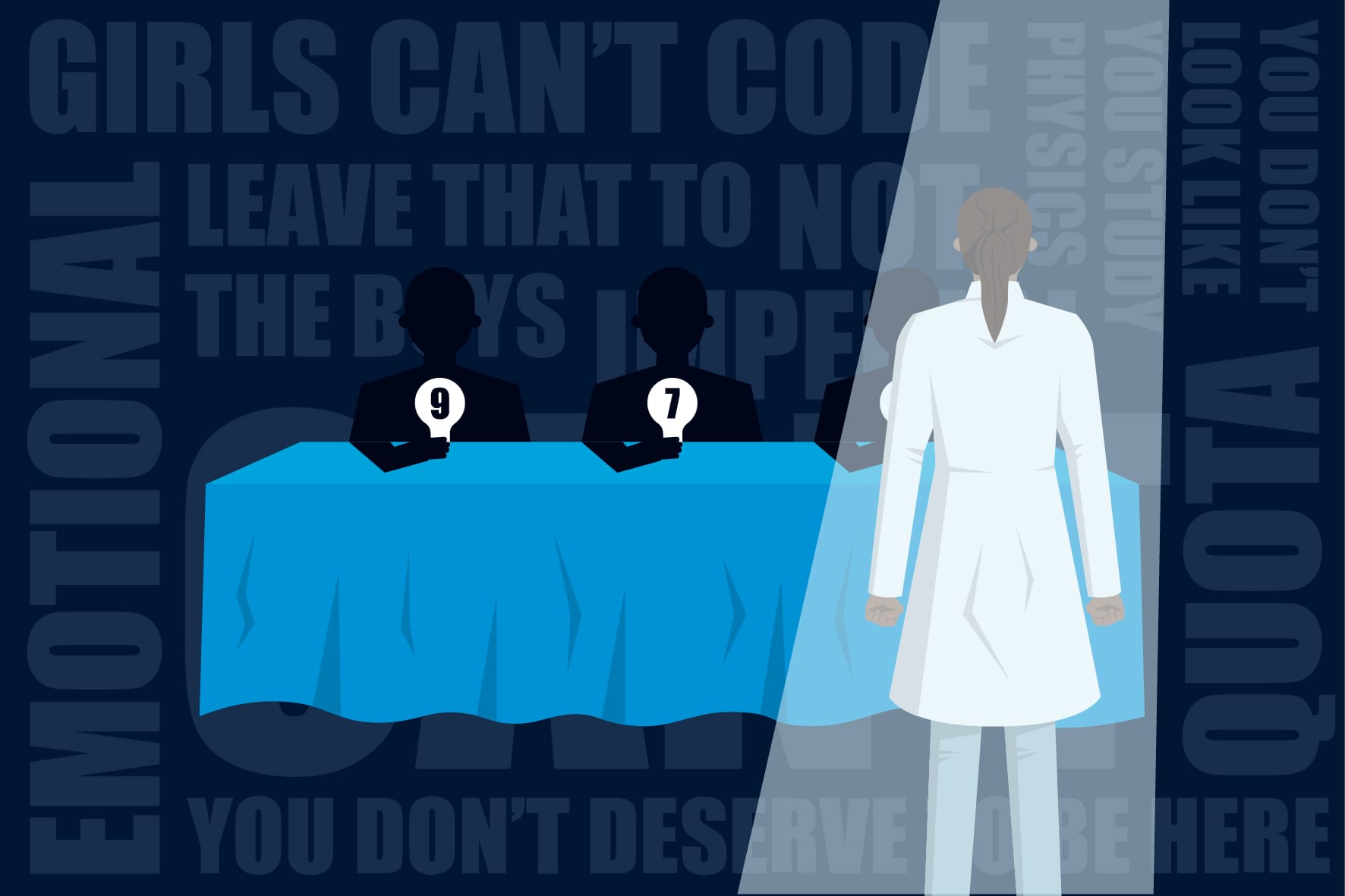
Women in STEM
Another significant theme that emerged from the survey was hostility faced by female students who were often told they should not be at Imperial. Overall, 38% of women had been told they couldn’t or shouldn’t do STEM subjects, with many students reporting being told they did not deserve to be there.
As well as comments about natural abilities – “women shouldn’t do engineering”, “women aren’t as good as men at hard sciences” – women reported being told positive discrimination or the use of quotas had made their time at university easier. “You only got an offer because you’re a girl”, was one comment reported in the survey, while “companies only hire female engineers to fill a quota” was another.
Serena*, a fresher in the Faculty of Engineering, reported similar experiences, saying she felt more pressure to do well at her subject as a result: “If a guy fails, they fail because they’ve not studied hard enough, but if a woman fails, it’s seen as being because she’s a woman. The reasoning completely changes.”
One aspect of Imperial life that can increase the visibility of women students is the infamous ‘Imperial ratio’ – used to describe the relative lack of female undergraduates compared to their male counterparts. This year, men made up over two thirds of the total cohort, with 730 male applicants placed, compared to 335 women, giving a ratio of roughly 70:30 men to women. This figure varies greatly between departments and years.
While some respondents described such language as “banter”, others highlighted the impact it can have. “It makes me feel like I shouldn’t be there”, said one student, while another said it “encourages the continuation of a mindset, even if it’s claimed in jest”. Some respondents said such comments had a cumulative impact on them during their time at Imperial: “I’m treated as less deserving of the job because I am a woman,” one said. “It tends not to be major, but just consistently every day – it chips you down.”
Serena talked to Felix about her experience:
“I think the biggest issue with misogyny is with my peers. Sometimes they will joke, like when we’re doing coding, they’ll say ‘oh girls don’t know how to code’. It’s discouraging – you’re just trying to do your work, and then these comments pop up. Even though it’s claimed to be done as a joke, or it’s subtle, I think it’s a reflection of how they really feel about women, deep down.”
Some departments have created networks for women to support each other on campus: students from the Electrical and Electronic Engineering (EEE) Department, for example, recently set up a society for women within the department, which they said they hoped would “bring together an active community of women in EEE”. Such initiatives to improve the experience of women in STEM have been adopted at higher levels within the College – the Juno Committee in the Department of Physics, for example, aims to address under-representation of women, while Imperial has been awarded an Athena SWAN Silver award for commitment to advancing women in academia.
While such moves may address the undercurrents of sexism, they have been met with pushback from a number of students and staff, both male and female. One female respondent said: “Women at Imperial should not receive any extra support – financially or emotionally. We should be made equal to men in every way [otherwise] we look incapable.” Another said they believed the main source of discrimination was against white middle-class men – a view echoed by a number of staff members who took our survey.
James*, an undergraduate aeronautics student, told Felix he felt positive discrimination was a major feature of the Faculty of Engineering: “You see all these posters promoting women in engineering, and there are a number of bursaries or funds that are only open to women, but no such schemes apply for men. Are the women here to fulfill quotas? Arguably, yes. Their technical ability seems to be lower [than the men], and ability-wise, a larger number of women in engineering don’t know what they’re doing.”
Professor Curry told Felix the College needed to “push back against [these ideas] even harder, because it’s a ridiculous proposition”. He says only 17% of professors at Imperial are women, and “if you’re going to argue the best people are at the top, that’s manifestly not true. That view comes from people who mostly function within their in-group, where they reinforce prejudices and biases”.
He says the idea women get lower offers is a presumption: “There is no evidence for it. No department has a policy that admits women on lower ratings.” While quotas in recruitment are not allowed in law, he says “departments are charged to make sure they are proactive about encouraging under-represented groups to apply.” While the College “will still appoint the best candidate every time”, increasing the pool of applicants will mean “there is a diverse field of candidates.” He remains optimistic for the future: “I think that is a position that is untenable, that is losing ground, and I think we are seeing a shift.”
"I was told I wouldn't be able to balance childcare with a PhD" – women on the path to academia
While students were more likely to hear peers make derogatory comments about women, nearly one in four women still reported experiencing misogyny from staff. More women also felt gender impacted how they were treated by their lecturers than felt the same about their peers.
As with comments from their peers, the vast majority of instances seem to take the form of off-the-cuff remarks: women reported teaching assistants saying they should be the one to shake up solutions since it would “help me learn how to cuddle my baby in the future”, tutors telling women in the group they could “do the easy equations”, and demonstrators in computer labs saying “trust girls to care so much about colours” when female undergraduates were picking out wires. Students reported feeling uncomfortable about these comments, but being reluctant to call them out lest they be seen as “humourless”.
A number of women at Imperial also reported not having access to the same teaching opportunities as their male peers. “I’ve had consultants preferentially teach the males in the hospital group, and sometimes ignored questions from me and my female colleagues,” wrote one medical student, while another said she was not allowed into surgery by her consultant since she “would make a great GP”. She was told to do work on the ward instead, while males in her group attended surgery.
Other women reported assumptions about their future life choices being used to convince them not to pursue careers in research. Frequently, respondents to the survey told Felix about times when they’d been told not to go into academia or other high-intensity careers because they would soon be having children, and “would not be able to balance childcare with work”. One medical student was told “there was no point in pursuing a high-flying research career, because I would soon get married, fall pregnant, and leave the profession”. This comment came from “a man hired to be a pastoral guide for female and male students, with power over their careers in terms of references.”
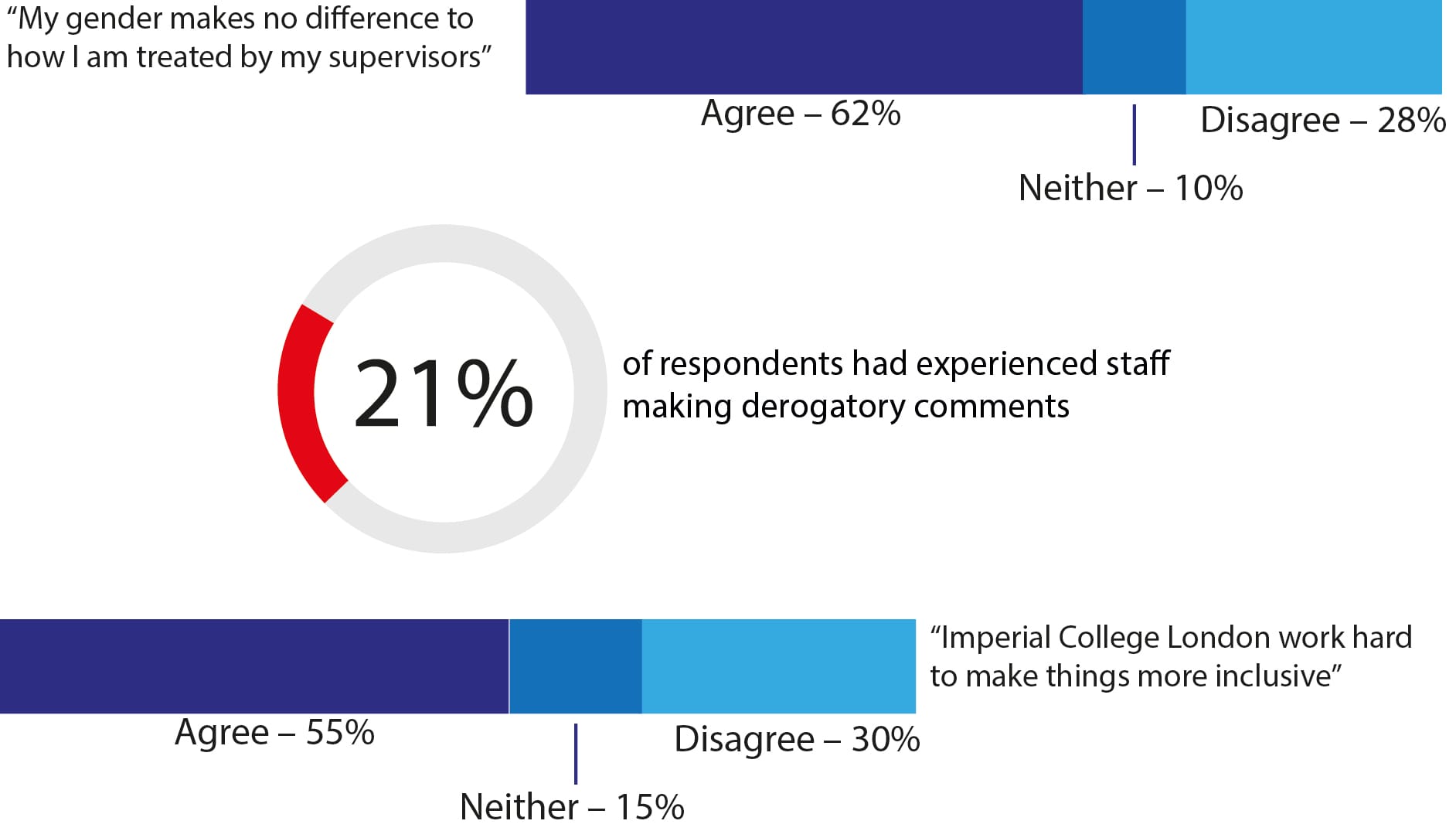
Another respondent reported frequent incidents of women being told to go into “teaching and jobs requiring empathy, like nursing”, even when they clearly expressed their intention to pursue a PhD, and had achieved top grades throughout their time at Imperial.
A 2014 report from the government’s Science and Technology Committee identified that only 17% of STEM professors were women, and that – while there was “no single explanation for the lack of gender diversity” – “it is the result of perceptions and biases combined with the impracticalities of combining a career with a family”. The report found that the early period of academic STEM careers was characterised by a lack of job security, and – since this period coincides with a time when many begin to think about starting families – there was a high attrition rate as a result.
Professor Curry believes this attrition rate can have a knock-on effect for women at the undergraduate level: “Most of the time, the person standing at the front of the lecture theatre is a man, so a young woman coming in to do a science or engineering degree thinking ‘what are my chances in this field?’, the rational assessment is that your chances are less than those of a man.”
As these women progress through the ranks of academia, as well as facing barriers from their superiors or those allocating grant funding, they will often face challenges from below, as students give them much more hostile feedback.
“Student feedback is incredibly biased against women,” one postdoc researcher reports. “Even if two academics deliver similar lectures and the outcomes for the students is the same, the feedback about a woman will be hostile and negative, whereas about men it will be pretty average.” She points to a study into student evaluations of teaching (SET) – surveys like Imperial’s SOLE, upon which universities often base promotion or firing of lecturers – which shows students regularly rate women lower than men. Such evaluations have become increasingly important in the higher education landscape as they help form judgements in the Teaching Excellence Framework – a rating system for universities which revealed its first set of results last year.
As well as the amount of scrutiny received, female academics will often be described in negative terms compared to men. A couple of years ago, Dr Ben Schmidt, an assistant professor of history in the USA, scraped descriptive data from 14 million reviews on RateMyProfessor.com, and compared what kind of adjectives were used to describe men and women. Words like ‘funny’, ‘cool’, and ‘brilliant’ were more likely to be used to describe men, while women were more likely to be called ‘harsh’, ‘annoying’, and ‘aggressive’.
Language can get quite vitriolic. One respondent told Felix: “My peers will frequently call female lecturers things like ‘bitch’ behind their back if work is returned late, but their male counterparts are not subject to anywhere near the same level of abuse.” Another student said: “One student was rejected at an interview by a woman, and started loudly saying unrepeatable things in the computer room about her on the basis of her gender.”
A first-year student from the Faculty of Engineering, spoke about her experience: “After our first term we had SOLE feedback, and this divide was evident. It was also there in our course group chats. If a man teaches poorly, they don’t really say too many negative things, but if a woman teaches something poorly, they’ll just relentlessly call her stuff like ‘bitch’.” “My peers,” she said, “are much less kind towards female lecturers.”

How can we improve inclusion across sports clubs?
In 2015, Women’s Rugby were scheduled to play out Varsity, having been assigned the Headline Match, However, after coaches left earlier than scheduled, the stands emptied while the match was in progress, and the team was left stranded at the stadium, despite previous assurances from Sport Imperial that this would not happen. The women’s team had also been promised dinner and drinks following the match, but arrived to find the men’s team had been fed, and were asked to leave the facilities. By the time the women arrived, most of the food was eaten, and the remainder was cold. Some team members also reported receiving abuse from a Sport Imperial employee, while one player told Felix that, as they were ushered onto the last coaches, “drunk male rugby players… were shouting how they were waiting for ‘those lesbians’.”
Following complaints from the Women’s Rugby Club, an investigation was launched by the College, which upheld the majority of the claims, but found “no evidence” for sexist or misogynistic language used by staff (members of the club maintain sexist language was used). Professor Debra Humphris, then-Vice Provost (Education), said: “As an institution that strives for excellence, we must take a leading role in moving towards a more mutually respectful community.”
Three years on, and with another women’s team headlining Varsity, have things changed?
While fewer students had experienced misogyny as part of their Club, Society, or Project (CSP) than within the academic sphere, over a quarter of the women surveyed said they had faced sexism. Of these, the vast majority were those involved with sports teams. In general, students were less likely to have experienced discrimination from fellow CSP members (21% of respondents had), but were much more likely to have faced it from members of other CSPs (36% of respondents).
A number of respondents reported clubs participating in sexist behaviour, particularly objectification of women. One student told Felix: “I have been in multiple sports clubs over the years, and am a fan of sports night. However, one game has particularly stuck in my mind. It was played by a male club, who would announce the name of a woman on their club’s other table, and then count up to ten. The male members of the club would put their hand down when they thought they had reached the appropriate rating for that girl. This was all in earshot of the girls they were rating.”
Other women reported sports teams “referring to Union ‘pussy’ as ‘cold’”, while another said “It would be nice to see women promoted more in sport, and not put down or harassed by men.” The organisation of sports teams at Imperial, and in particular the resources different clubs receive, was also a source of discontent for women in sports. In total, about 30% of respondents agreed with the statement “Sport Imperial(the College’s sporting body) ensure all sports teams are treated equally”, while the same number disagreed, and the majority were undecided. However, when respondents not involved with sports teams were removed, the majority of students felt Sport Imperial did not treat teams equally, with only 12% of women agreeing they did.
While some of this discrepancy could be explained by the fact men’s and women’s teams may be in differently classed divisions, a number of students said they felt women’s clubs were not provided with as much support. “Even though the two teams [of my sport] are in the same division,” one student told Felix, “most people seem to believe the men’s team is more important. They get better training slots, and much more funding for coaching.”
Another club member said: “Our club has had to struggle to be taken seriously and included in Imperial activities, whereas our male counterpart is one of the most respected clubs. I believe it is only through them helping us that we have been taken seriously.”
Emma*, a member of a women’s sporting team, told Felix: “I think Sport Imperial has a completely different set of goals and values to what can be expected of a sports coordinator. Their primary focus is branding and ‘value added’ to the College reputation, as opposed to engaging as many people as possible. It is not acknowledged that women’s sports are more likely to recruit beginners, and therefore need more support and coaching to be able to safely play these sports.”
She went on to say the higher membership numbers for men’s clubs meant they got preferential allocation for training space; some women’s sports teams train until 11pm on weekday nights, meaning members didn’t get home until past midnight. She also highlighted that increased centralisation of sport services, combined with the fact many women sports players are spread across campuses, has meant female students are more likely to be involved with sport at a local level.
Emma also raised concerns about current promotion of women in sport, saying Imperial Girls Can week was “a particularly sore spot for everyone I know”: “Patronising ‘calorie burning’ spin classes, turning up and giving out pink t-shirts at our regular BUCS fixtures… when really members of our committee are buying kit and equipment out of their own pocket, organising the referees, and coaching the team themselves with no payment or training – it tasted particularly bitter.”
In a statement for Felix a College spokesperson said: "Sport Imperial is committed to encouraging participation from all students. We know that women can face barriers in participating in sport, that’s why we work to challenge perceptions, celebrate women’s sport, and create an environment where everyone feels comfortable."
"It is not the case that Sport Imperial gives preferential funding to male teams. Sport Imperial funding is allocated to clubs according to where their highest ranked team sits within BUCS – this could be a men’s or women’s team. The club itself then makes the decision as to how this funding is distributed, and to which teams. For sports that are not included in BUCS, clubs can apply for funding which is allocated based on the developmental and competition requirements. Sport Imperial applies an objective process with equal opportunities for both men’s and women’s clubs and teams."
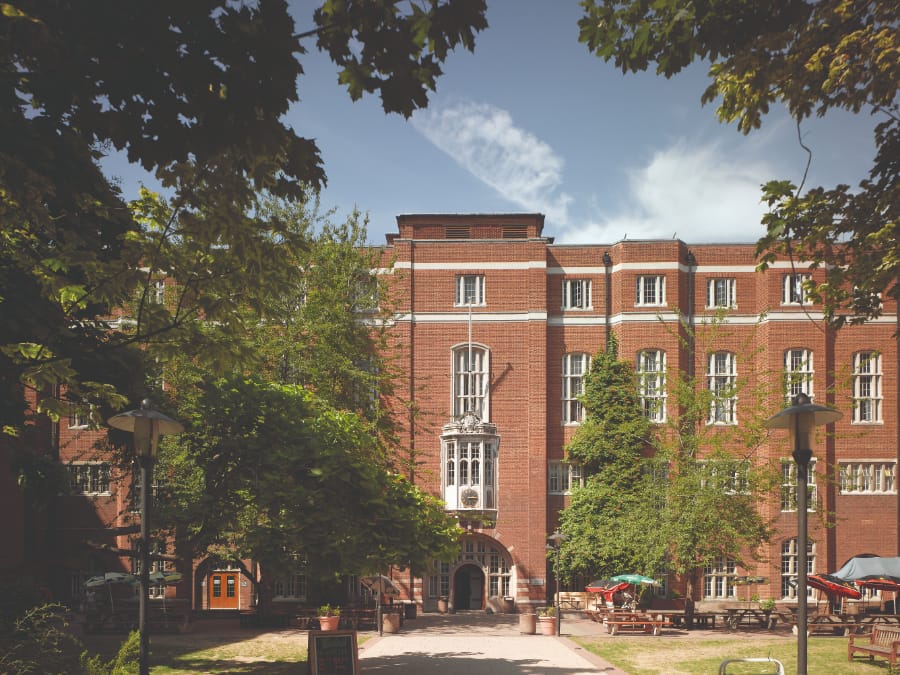
Lack of support is a concern for many when it comes to reporting sexual violence and harassment
Susan* had just started her third year at Imperial when she was sexually assaulted by a staff member, on a night out that had been arranged for students. “At first, when he came out with us, I was thinking ‘does anyone else find that a bit weird?’” she told Felix. “He gave me a hug, then another, and another all in quick succession. It made me feel incredibly uncomfortable, and I decided not to talk to him for the rest of the evening.” However, the staff member continued to come up to Susan throughout the night, despite the fact she had made it clear she didn’t want to spend time with him: “He came up to me and started chatting, so I just went back inside, but he found me again, and commented on my breasts.”
Later on in the evening, when the group had moved on to a different venue, Susan and the staff member ended up near each other at the bar: “He kept asking me what I wanted to drink, over and over, so I turned away, because I just didn’t want to speak to him. He asked ‘why won’t you talk to me? Why won’t you let me buy you a drink?’ And then he grabbed my ass.”
Susan’s experience is not an isolated incident within higher education: an investigation by the Guardian, published around a year ago, found students in the UK had made at least 169 allegations of staff sexual misconduct towards students, including three incidents at Imperial. The actual number of incidents is likely to be much higher; Dr Ann Olivarius, a senior partner at law firm McAllister Olivarius, said these results were “just the tip of the iceberg”, while Dr Anna Bull, co-founder of the 1752 Group, which aims to tackle sexual misconduct in higher education, said: “There is evidence to suggest that the actual figures in the UK would be staggering.”
Susan chose not to report the incident to the College or the Union, citing the pressure such proceedings can have: “If something happens to him, if he loses his job, does that become my responsibility? And then all of these proceedings are fairly uncomfortable to go through. Already when these kind of things happen you think you’re in the wrong, and then having to explain what happened to someone else is just horrible. It’s just such a difficult thing to do.”
The 1752 Group has a number of strategic priorities, implementation of which would go some ways to addressing sexual misconduct in higher education. One is to “implement an enforceable national code of conduct that clarifies professional boundaries”: the group says students are often “unsure what behaviour is acceptable” from staff members, due to “blurred lines around the professional relationship between staff and students.” This is something Susan found in her experience: “All these things are grey areas – I’ve been to drinks for research groups, and that sort of thing, because it’s a work setting, but we need to draw clear lines. Even though we are both adults, he’s still in a position of power over students, and that kind of behaviour – going out with students – is wrong. But it’s not advertised as being wrong – nowhere at Imperial.”
“If you are assaulted at university, then it is a university issue. I don’t think I’ve seen anything at Imperial saying ‘if a staff member does this you need to report it’. And that’s quite an astonishing oversight.”
These concerns over the ability to handle sexual misconduct were echoed by a number of women Felix spoke to, with one postdoc saying: “UK universities do not have the policies to be able to cope with [staff-student sexual harassment and bullying] at the moment – and that’s quite frightening.”
While Susan does not have classes with the man who assaulted her, she still has to see him in the department occasionally – something which greatly affects her: “I’ve seen him, and he’s made eye contact with me and said hello. I just feel so uncomfortable and nervous, and I just don’t want to say anything back.”
Susan is one of the 8.5% of respondents to our survey who reported having experience of gender-based violence – a broad term defined by the Council of Europe Convention on preventing and combating violence against women and domestic violence as “violence that is directed against a woman because she is a woman, or that affects women disproportionately”. While this violence does not necessarily need to be sexual, the majority of reports Felix obtained through the survey related to sexual assault and rape.
The actual proportion of students who have experienced sexual assault may well be higher: one NUS report suggests that one in four female students across the UK has been sexually assaulted, with far more facing sexual harassment. The College, on its website, says it is “committed to promoting a university environment where everyone feels safe, supported, and respected”, while ICU’s Safe Space Policy aims to “create an environment in our venues that all students, staff and visitors feel safe, happy and protected in.”
Unfortunately, a number of those who filled in our survey did not feel safe on campus: “I have been harassed by unknown men whilst going about my everyday life since puberty,” wrote one respondent. “It was only when I arrived at Imperial that I began to face harassment from my peers… I have been touched, grabbed, and mauled without consent. I have felt frightened and scared of being raped. I rarely felt that any of my male peers respected me as an equal human being.”
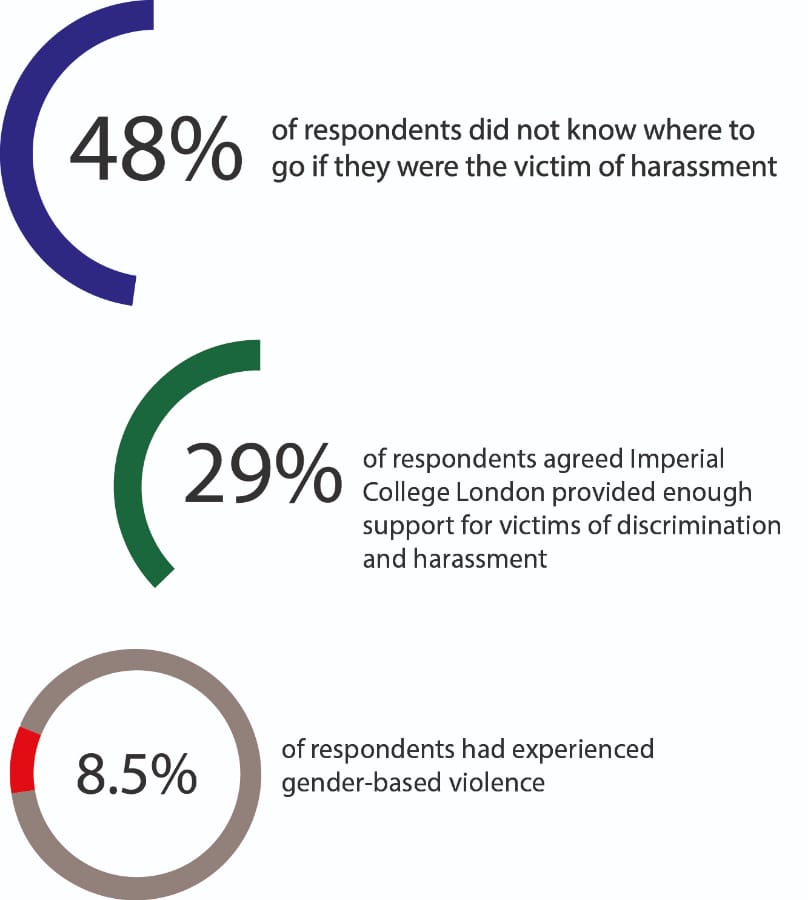
The Union building seems to be a hotspot for sexual violence, particularly at events like ACC Night. “If ‘gender-based violence’ includes minor sexual assault – slaps on the bum, that sort of thing – then it’s certainly something that happens on a regular night in the Union,” wrote one respondent, while others reported being groped in 568 or sexually harassed in Metric. One respondent said the Union Bar was where she had experienced the most derogatory comments and the greatest number of threats of sexual violence.
When women have faced violence, many do not feel confident about reporting it to the College or ICU. In a survey organised by an Imperial student earlier this year, only 8.7% of respondents said they would report a sexual assault to ICU, citing concerns about the incident being treated as minor, or fear they would be blamed or not taken seriously.
Some women who had reported their cases said they were not satisfied with the results: one woman, who had been raped, told Felix: “College did nothing, nor did the Union. That was only one of a number of cases I believe have been swept under the carpet.” Another, who was raped by another student whilst unconscious after a night out, said the College had not been helpful: “I was advised that if I was unsuccessful with the police that I would have to see them on campus every day, and that it would simply make my university experience more difficult. Imperial’s culture of protecting students’ reputations above wellbeing is partially responsible for this.”
Last term Felix reported on the experience of one alumna who had reported her sexual assault to the College and the Union; the investigation took more than seven months to be completed, during which time the victim was passed between at least six staff, and left unsupported. “This experience pushed me back into a suicidal state,” she told Felix. “Absurdly, the sexual assault investigation was more distressing that the sexual assault itself.”
Another student said she had never reported incidents of sexual harassment “simply because there is no clear channel to do so…Imperial should implement an easy to use, online sexism and harassment reporting tool”.
Others mention that existing services at Imperial are not advertised. Susan, prior to being assaulted by the staff member, had been sexually assaulted on campus by a non-Imperial student, after being emotionally manipulated into going to an isolated area with him. This time, she reported it to campus security: “They were incredible. They took me down to their office, and made me feel so comfortable. If you are assaulted, you are under no obligation to report it – you’re so busy trying to process what happened, the thought of having to explain it to someone else is unthinkable – but the security services were fantastic.”
After taking a statement from Susan, security phoned the police with her consent, and helped to make a report. They posted the perpetrator’s face on the College’s security boards and shortly after he was arrested while leading another girl away from the main campus. With Susan’s consent, the security services got in touch with College tutors, and helped her organise mitigating circumstances. She was also fast-tracked into the College counselling service. “Reporting these kind of things is one of the hardest and most unthinkable things you can consider in that situation. However, there are services to go to if you know where they are on campus – I would never have gone to the Union with this, but security were fantastic. If you can report it, and you feel like you can – it’s no way an obligation – there are things you can do.”
One of the reasons Susan wanted to share her experience was to let people know there were places they could go to for help. Our survey found that many respondents are unaware of available support: fewer than half of respondents said they knew where to go if they were the victim of discrimination or violence, while only 22% of women surveyed felt that the College was doing enough to provide support for victims of discrimination.
The topic of sexual misconduct has become more prominent on university campuses, and the College is setting up a working group to deal with the issue. Professor Curry told Felix it would “look across the board at staff and student experiences, and come up with a unified set of policies and procedures that create a credible reporting system, so that staff and students don’t feel like there is nowhere to go”.
As well as the creation of a more accessible reporting system, the group should also clarify and codify what behaviours are considered acceptable from academics – a topic Professor Curry believes academics are becoming more aware of as a result of increasing discourse.
One of the key challenges the working group will face, Professor Curry admits, is the issue of communication: “There are gaps, and in a large, complex organisation [like Imperial] there are always going to be gaps, or problems with communication, which recent cases have highlighted. One important thing is to make sure the students’ union and the College are joined up in a way that works for students.”
“It’s a big job to do,” he says, “and it can’t be dismissed or brushed under the carpet.” Names have been changed. If you have been affected by anything discussed in this article, please consider phoning The Samaritans(116 123), Rape Crisis (0808 802 9999), or Survivors UK (020 3598 3898) for confidential support and advice. Students can also contact their Faculty Senior Tutors for support, or reach out to ICU’s Advice Centre, which offers independent, impartial, and confidential advice.


